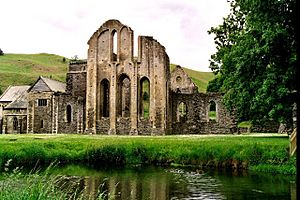Guto'r Glyn facts for kids
Guto'r Glyn (born around 1412 – died around 1493) was a famous Welsh language poet and soldier. He lived during a time when professional poets, called Beirdd yr Uchelwyr (which means "Poets of the Nobility"), traveled around Wales. Guto'r Glyn is thought to be one of the very best at writing "praise-poetry." This was a special kind of poem written to honor and compliment a rich or powerful person who supported the poet.
Biography

Guto'r Glyn came from the Ceiriog Valley in north-east Wales. Many of the important people he wrote poems for lived in this area. He traveled all over Wales during his life. We don't know much about his early years, but he was likely born between 1412 and 1420 in places like Glyn Ceiriog or Glyndyfrdwy.
Some people believe that "y Glyn" in his name refers to Valle Crucis Abbey. They think he might have been a child adopted and raised by the abbey. This would explain his later connections to Cistercian monasteries. Guto was not from a rich or noble family; he probably came from a farming background. His real name was Gruffudd ap Siancyn, using the patronymic system common back then, where "ap" meant "son of."
Guto became a well-known poet quite early, by the 1430s. In 1441, he joined the army to fight in the Hundred Years War against France.
From his poems, we know Guto was a big, strong man. He was known for his bravery and his skill in sports. He had a beard and black hair, but he quickly went bald! He even joked about it, comparing himself to a monk with a shaved head. Poets in those days often wrote funny poems insulting each other. Another poet once said Guto wasn't good-looking and had a nose like a tool called a billhook.
Guto was a master of "praise poetry," which meant writing poems to honor important people. But he was also good at satirical poetry, which uses humor to make fun of things. Like most poets, he could be very witty. He once worked as a drover, moving sheep. He lost a priest's sheep, which led to a funny poetic argument with another poet, Tudur Penllyn. Guto complained that Penllyn didn't help him. Penllyn replied by making up a wild story about what happened to the sheep and even made fun of Guto's baldness!
Guto wrote his most powerful poems later in his life. These poems talked about life and death. He even said his earlier poems were just "babbling sweet nonsense."
As a soldier, Guto fought for the Yorkist side during the Wars of the Roses. This was a series of wars between two powerful families, the Yorkists and the Lancastrians, who both wanted to rule England. Guto wrote poems praising King Edward IV and other important Yorkist leaders. But after the Battle of Bosworth, when the Lancastrians won, he praised the Welsh Lancastrian leader Rhys ap Thomas for defeating King Richard III. Guto wrote that Rhys "killed the boar, shaved his head," referring to Richard III.
Guto also fought in France and traveled a lot for his time. He lived for several years in the town of Oswestry in Shropshire, England. He wrote a poem praising Oswestry, saying he was "Long wedded here, a burgess am I," which meant he was a free citizen of the town.
Guto spent his last years at the Cistercian abbey of Valle Crucis, near Llangollen. He was blind during this time and lived there as a guest.
 | Sharif Bey |
 | Hale Woodruff |
 | Richmond Barthé |
 | Purvis Young |

